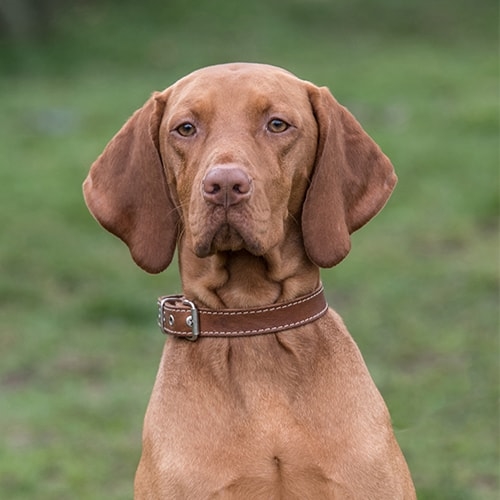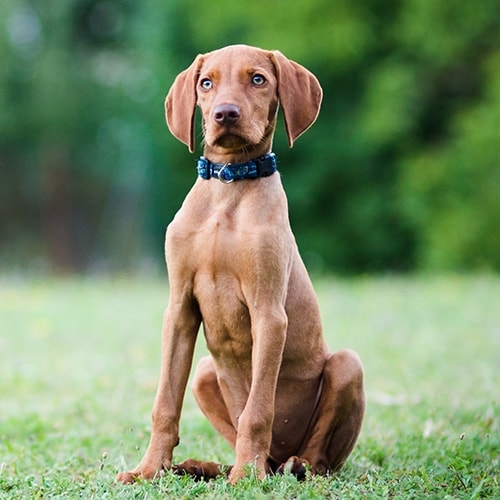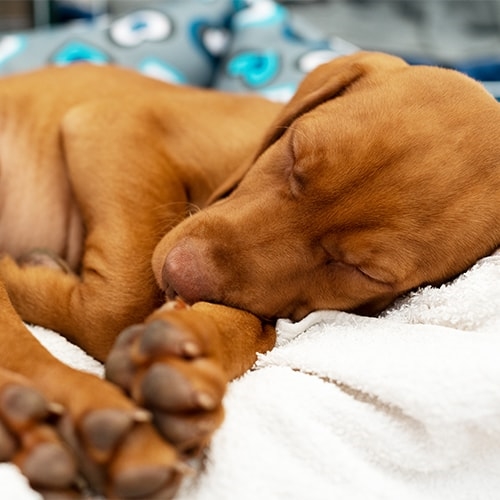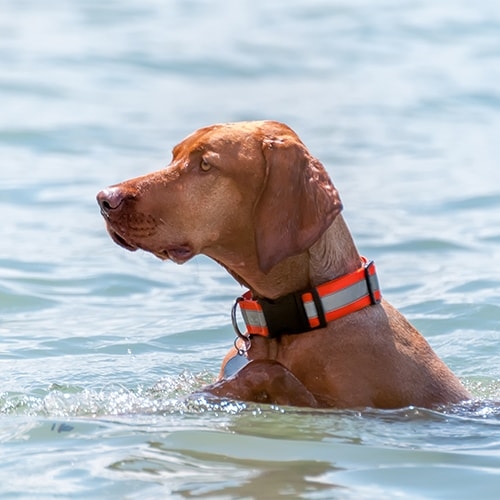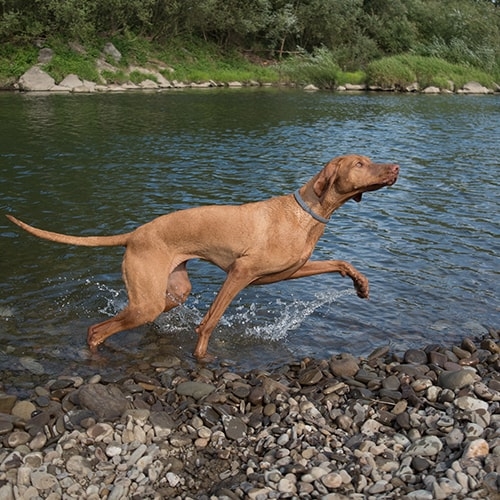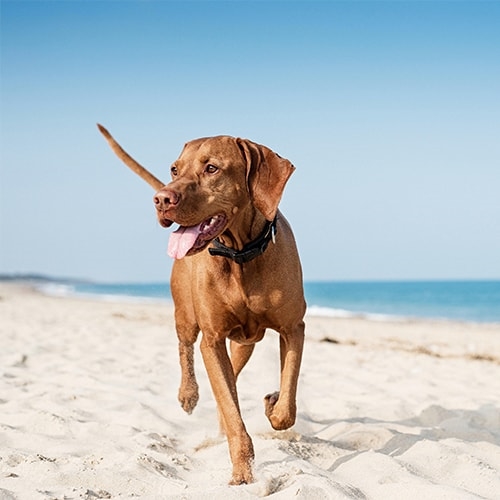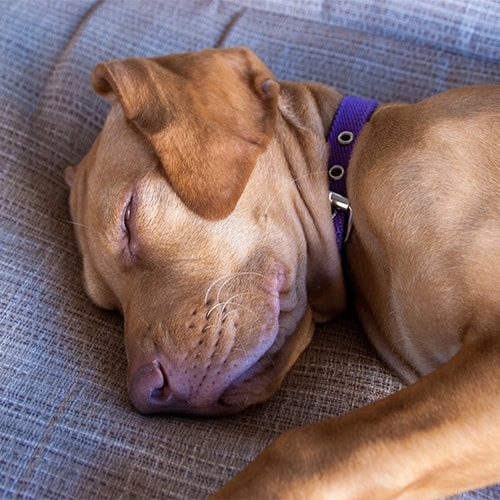| Size | Large |
|---|---|
| Average height | 53-64cm |
| Average weight | 20kg-30kg |
| Average lifespan | Over 12 years |
| Minimum exercise (per day) | 2 hours |
| Coat length | Short |
| Minimum cost (per month) | £80 |
Hungarian Vizslas are lively dogs who love to be busy. They’re athletic dogs who enjoy being around people and so need active owners who enjoy getting out and about.
Originally bred to retrieve, Vizslas need to be really active and will love playing games of fetch with a dog-friendly toy! They’re really clever dogs which can make them easy to train in the right hands and they love to be involved in everything going on around the home. However, they require a lot of effort, motivation and consistency to help them develop the behaviours you want from them, which usually means they are not suitable for first time dog owners.
Common health problems in Hungarian Vizslas
Hungarian Vizslas are sociable and friendly dogs who can make great family pets, but unfortunately like many purebred dogs, they are prone to certain conditions.
If you are thinking of buying a Hungarian Vizsla puppy, make sure the parents of your puppy have had the relevant health screening to reduce the chances of your puppy being affected by certain conditions. We’d recommend looking for a Kennel Club Assured Breeder as they meet extra requirements which will benefit your puppy’s health.
Some of the conditions Hungarian Vizslas may develop include:
- Hip dysplasia – where the hip joint doesn’t fit together perfectly, which will eventually lead to arthritis. Before breeding, dogs should be screened by x-rays through the BVA/Kennel Club Hip Dysplasia Scheme.
- Entropion – where the eyelids turn inwards and cause irritation and pain.
- Epilepsy – a brain disorder causing seizures.
- Certain cancers.
- Autoimmune conditions – a condition where the body reacts against itself.
- Hyperuriocosuira (HUU) – a condition affecting wire haired Vizslas where stones can form in the bladder requiring surgery. Parents should be screened.
If you want to minimise the risk of your dog getting problems, you can read our advice on choosing a pedigree dog.
Caring for your Hungarian Vizsla
Vizslas are high maintenance dog due to their exercise needs and personality. They need daily exercise and lots of mental stimulation, so if you’re a couch potato they are not the breed for you! They form strong bonds with their families and are so eager to please that you’ll find they pick up on their training really quickly.
It’s important that your Vizsla gets enough exercise every day to keep them happy and healthy. If not given enough mental and physical stimulation, they frequently get bored and take out their frustration on your furniture and belongings.
Hungarian Vizslas and barking
Your dog is likely to make noise and this will depend on their individual personality and training. Some owners say Vizslas are fairly quiet, but others say they like the sound of their own voice. As long as you’re giving your dog enough exercise, mental stimulation and not leaving them alone for long periods this will help keep barking to a minimum. If you’re having problems with excessive noise, we recommend seeking the advice of an accredited behaviourist.
Training and socialisation
Hungarian Vizslas respond really well to positive, reward-based training from an early age because they are so eager to please their owners. They’re very clever dogs, which means that they can pick up new things easily – both wanted and unwanted habits! Their energy levels and strong personality means they are not suitable for first time dog owners. If you need a bit of extra guidance with training, we’d recommend taking them to accredited training classes.
Hungarian Vizslas are social and friendly dogs so as long as you socialise your Vizsla from a young age with lots of people, dogs and experiences they will grow into happy and confident adults.
Vizslas form strong bonds with their owners and love human company so often suffer with separation anxiety if left alone. Ideally, your Vizsla will need someone around all day to keep them company. If left alone they can develop negative behaviour due to stress.
Exercise
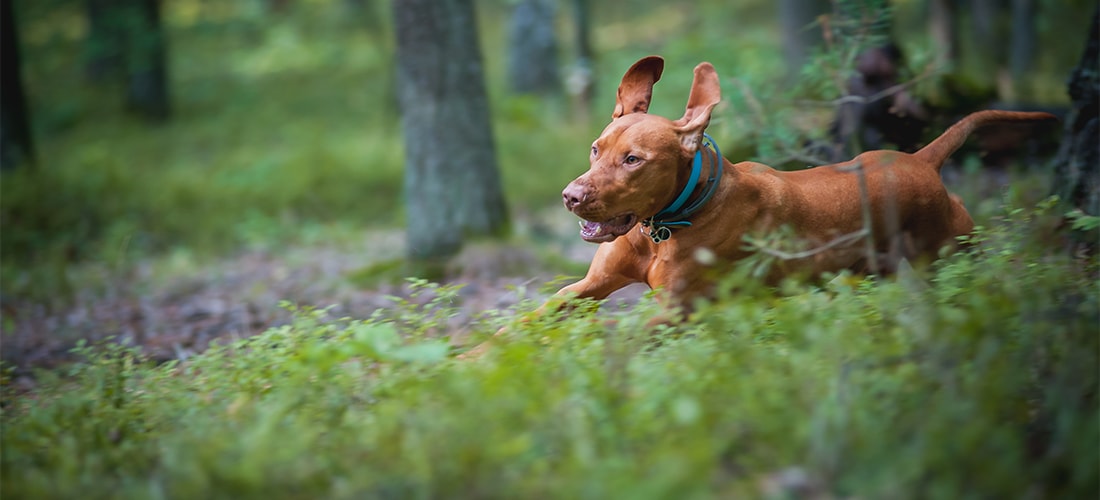
Hungarian Vizslas are really high energy, so you’ll need to be prepared to give them plenty of exercise whatever the weather. They’re perfect if you’re looking for a new running partner – just remember you’ll have to keep up with them!
Your Hungarian Vizsla will need a minimum of two hours exercise every day. This needs to be split into several walks with lots of time to run around off-lead in a secure area. They have a keen sense of smell so make sure your Vizsla gets at least one long walk a day somewhere interesting they can have a good sniff.
On top of their two hours, your Vizsla will need lots to keep their brain active such as training and fun puzzle games. They are very agile dogs so often do well at canine sports such as agility. Vizslas are known for being big water lovers, so remember to stay safe if you decide to take them for a swim.
Grooming
Vizslas are really low maintenance when it comes to grooming. Thanks to their short fur, a weekly brush should be enough to keep their coat looking nice and shiny. They’re unlikely to need a bath unless they roll in something particularly nasty.
They do tend to shed like any other dog although most owners find they can keep on top of hair around the home with a regular hoover. As Vizslas don’t have an undercoat, their fur isn’t very thick so they can feel the cold easily. If you take your Vizsla swimming, remember to dry them off quickly so they don’t feel the chill!
Hungarian Vizslas and children
Hungarian Vizslas are very people orientated dogs who love company. Because of their playful nature, they get along really well with older children they can play with. We wouldn’t recommend a Vizsla if you have very young children as they are such boisterous and bouncy dogs they might knock them over accidentally.
Remember to make sure you can recognise your dog’s body language so you can put a stop to any potentially stressful situations before they escalate. Always supervise your dog with children and vulnerable adults.
Hungarian Vizslas and other pets
Vizslas are very sociable by nature. As long as your Hungarian Vizsla has been socialised well from a young age, they should get along fine with other dogs.
Hungarian Vizslas do have a high prey drive, so we wouldn’t advise keeping them with smaller pets. They may get along OK with a cat they have grown up with, but you should always supervise your Hungarian Vizsla with other animals in the home.
Food
Your Hungarian Vizsla’s diet will vary depending on their age. You’ll need to feed them a complete, balanced dog food to keep them slim and healthy.
Your vet will be able to tell you how much your Hungarian Vizsla should be eating. You should feed them a good quality, commercially available, complete dog food. We usually recommend splitting their daily allowance into two meals. If you give your dog the occasional treat or use treats for training, remember to take this into account and reduce their daily allowance. Treats shouldn’t make up more than 10% of their daily calorie intake as this can unbalance their diet.
Try to feed your dog at similar times every day as they like routine. Remember to leave a gap between eating and exercising.
The cost of owning a Hungarian Vizsla
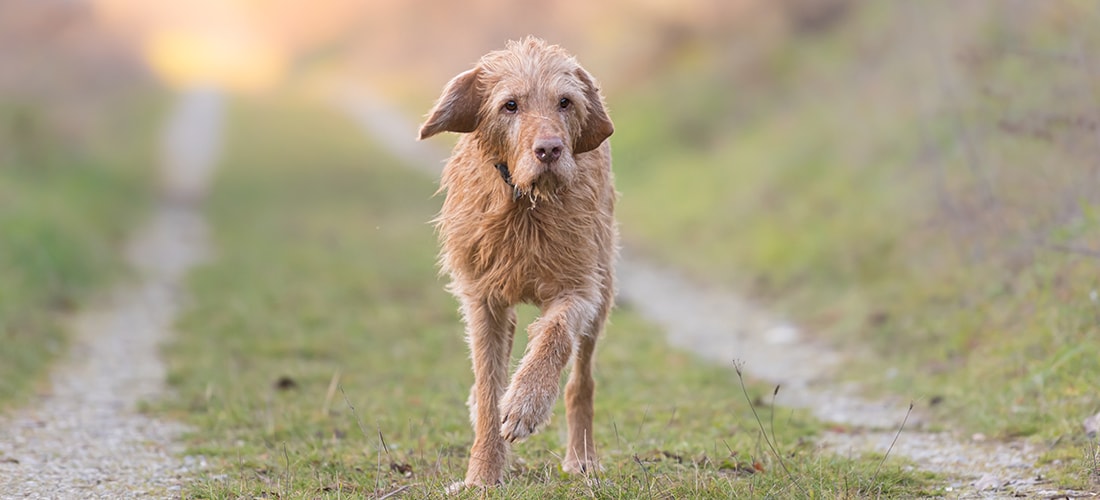
You can expect your Hungarian Vizsla to cost you a minimum of £80 per month after purchase and set-up costs and over £13,000 across their lifetime.
Costs you’ll need to think about include:
Purchase costs
Adopting an adult Hungarian Vizsla from a rescue centre may be a more cost-effective option, with the added advantage of giving a home to a pet without one – check if the rehoming centre you’re looking at asks for a donation for rehoming.
If instead you’re buying a Hungarian Vizsla puppy from a breeder, you’ll need to factor in this cost. Beware unusually cheap puppies as they could come from a puppy farm. If you’d like to buy a pedigree puppy, we recommend looking for a Kennel Club Assured breeder. These breeders must do extra health tests and meet higher standards.
Set-up costs
- Puppy vaccines – if you rescue a dog, reputable centres will often vaccinate them for you. Remember that ongoing booster vaccinations will be needed to continue their immunity.
- Neutering – you should usually arrange for your dog to be neutered at around 6-12 months old, though your vet will be able to advise you exactly when is best. Check prices at your local practice as these will depend on your vet and where you live. Some rescue centres will neuter any dogs they rehome, saving you this cost.
- Equipment – including a collar and tags, lead, harness, dog beds, dog bowls, pet-safe toothpaste and toothbrushes, grooming brushes and toys. Keep in mind that all these will need to be replaced with wear or damage or if your dog outgrows or damages them!
Ongoing costs
- Food.
- Preventive healthcare – budget for routine vet visits to help stop your dog getting ill and catch any problems early. They need annual check-ups, vaccinations and regular flea and worming treatments. Check if your vet offers a health care plan as this can help spread the cost throughout the year.
- Vet bills* or pet insurance – if you don’t have pet insurance and your dog needs veterinary treatment for an injury or illness, costs can rapidly mount up. Check what’s covered and what isn’t when comparing policies.
- Accessories – including lots of poo bags, replacing worn toys and grooming accessories, buying doggy toothpaste and any other extras they might need.
Other costs
- Training – basic training is very important and dogs can benefit from formal classes. Some dogs may have, or develop, behavioural problems which might need professional management.
- Boarding – you may also need to budget for boarding or dog sitting costs if you are planning to go away from home on holiday.
- Dog walkers/day-care – you might consider a professional dog walker to keep your dog happy and healthy if you’re unable to get out with your dog enough yourself, or to look after them during the day if you need to be out for more than four hours.
* It’s always better to plan ahead and budget or get pet insurance in case your pet gets injured or unwell. If you are having difficulty with veterinary costs, you can check if you are eligible for treatment at PDSA here.
If you’re considering pet insurance, our PDSA Pet Insurance could be a great option for you and it’s quick and easy to get a quote online.
Fun facts
- Hungarian Vizslas were originally used as retrieving dogs in falconry.
- They’ve earned the nickname ‘Velcro dogs’ because they like to stick close to their owners.
- They can be really fast and some studies have recorded them getting up to 40mph running!
- The oldest recorded Vizsla lived to over 20 years old.
Getting a Hungarian Vizsla
Do plenty of research before getting a Hungarian Vizsla. These sociable and active dogs need lots of attention but make really great companions for active owners. They’ll enjoy being around you and definitely provide you with plenty of entertainment, just by being themselves!
Rehoming centres
There are plenty of rescue centres across the country where you may find a Hungarian Vizsla. Breed-specific rescues that specialise in Hungarian Vizslas are also out there. You’ll need to ask any rescue centre about the dog’s history to make sure they will be comfortable in your home. Good rescue centres should let you know of any health and behaviour problems.
Breeders
If you buy from a breeder, make sure your puppy will be well socialised and have all necessary screening tests, health checks and vaccinations. It’s really important that Hungarian Vizsla puppies from a breeder get the right early socialisation so always ask the breeder about how they go about this. We recommend looking for a Kennel Club Assured breeder as they meet higher standards. We’ve put together some advice to help you find a good breeder.

